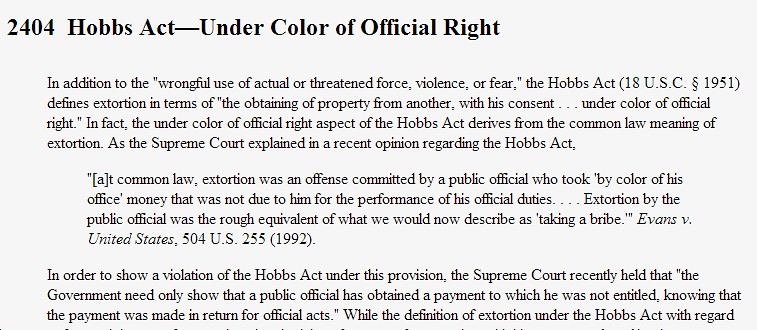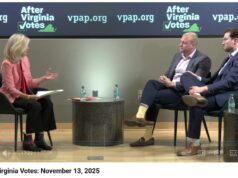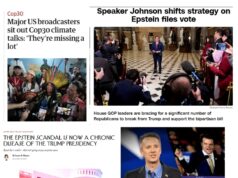(UPDATE: Jeff Schapiro asks about Senate Republican floor leader Tommy Norment and House Speaker Bill Howell, “What did Norment and Howell know, and when did they know it?” I also got an email from someone who basically said that Terry Kilgore isn’t bright enough to have figured all this out, certainly not on his own. – promoted by lowkell)
 With the FBI investigating the scandal surrounding Sen. Phil Puckett’s resignation from the Virginia State Senate (in exchange, apparently, for a job for himself on the Tobacco Indemnification and Community Revitalization Commission, as well as a judgeship for his daughter), there’s increasing chatter about whether there might end up being a criminal prosecution of Puckett and potentially others (e.g., Del. Terry Kilgore) in this case. For instance, Sen. Chap Petersen – a very sharp attorney – has a fascinating Facebook thread going on this subject. Here’s an excerpt:
With the FBI investigating the scandal surrounding Sen. Phil Puckett’s resignation from the Virginia State Senate (in exchange, apparently, for a job for himself on the Tobacco Indemnification and Community Revitalization Commission, as well as a judgeship for his daughter), there’s increasing chatter about whether there might end up being a criminal prosecution of Puckett and potentially others (e.g., Del. Terry Kilgore) in this case. For instance, Sen. Chap Petersen – a very sharp attorney – has a fascinating Facebook thread going on this subject. Here’s an excerpt:
This is not good stuff. Having said that (and assuming the worst to be true), I don’t see any crime, or attempted crime, involved. If leaving an elected position to take a public job is a crime, then that’s an exponential expansion of our corruption laws beyond any former precedent. Every administration will see 5-6 lawmakers (minimum) who will leave their seat in order to take a position with the state government.
Yes, the Puckett case is different: first, because it involves an evenly divided Senate so the resignation immediately led to a power switch and, second, it occurred while we were still in session and had a major vote pending on the budget and Medicaid.
The Puckett situation was lousy and I’ll go on bashing it at every chance. But the political context of an act cannot itself establish criminality. If leaving the Senate for a state job is okay when one party has a major advantage, then it doesn’t become illegal just because the parties are 50/50. If you leave, you leave.
The only potential “crime” would be if the job offer were tied to a particular vote (or failure to vote). And we’re not there yet.
Meanwhile, Sen. Creigh Deeds – another sharp attorney – weighs in on Chap Petersen’s Facebook thread, writing that:
Such self serving conduct may not be a criminal act, but it completely undermines public confidence in the political process. If the Tobacco Commission has the resources to create a job for Phil, it has too much money and too little oversight.
And Karen Duncan – not an attorney, but also super smart – argues at Anonymous is a Woman (with her first post there in almost 5 years – welcome back!):
I will repeat that I don’t know that any of this rises to the level of breaking the law.…
Even if you don’t believe what Phil Puckett and Terry Kilgore did was illegal, by the true measure of ethical behavior, all but the most partisan would agree that these were not honorable men nor dedicated public servants putting their constituents before their own selfish gain and power grabs.
So: three smart people, including two astute, experienced attorneys, all agree that what happened with the Puckett resignation was “lousy,” “unethical,” “not honorable,” etc. But was it actually illegal? Nobody seems to know the answer to that question. And that certainly includes me. However, in looking into this, I think that there are two major issues that the courts will be focused on, if it comes to that.
1. Whether there was, as per the Hobbs Act, a situation here in which a “public official commits extortion under the color of right when he obtains a payment to which he is not entitled knowing that it was made in exchange for official acts.” Based on the emails obtained by the Washington Post under the Virginia Freedom of Information Act, that seems like this part – the “quid pro quo,” essentially – can most definitely be proven. As the Post writes, “[Sen. Phil Puckett’s] exit, which handed Republicans control of the evenly divided Senate in the middle of a standoff over the state budget and Medicaid expansion, was connected to job prospects for Puckett and his daughter.” Sure sounds like a “quid pro quo” to me.
2. If a quid pro quo is ultimately proved in court, then it probably comes down to a much tougher question: does resigning from a public office, even in exchange for something of tangible/material benefit, constitute an “official action?” In the case of Sen. Puckett, I presume that the prosecution’s argument would be, in part, that Puckett’s resignation was timed to directly impact public policy – in this case, the Virginia budget and Medicaid expansion (or not) – thus it was almost by definition “official.”
The defense, I’d think, would push back that there have been a gazillion elected officials over the years who have left their positions for other jobs, including in gubernatorial or presidential administrations (e.g., Karen Duncan notes that Bob Brink just resigned his seat in the House of Delegates in order to take a job with the McAuliffe administration, but argues that it’s a completely different situation from Puckett’s). Of course, I’m sure that many (most?) of those were perfectly legit, nothing ethically or legally questionable about them. But I’d also be shocked (shocked!) if there haven’t been all kinds of shenanigans over the years regarding appointments to state and federal boards, commissions, etc. The defense would also make the case that Puckett’s resignation, despite the appearance/timing/etc, was not designed with a specific policy end (e.g., killing Medicaid expansion in Virginia, at least for now) in mind. Good luck with that last one, IMHO, but we’ll see…
Have any similar situations been prosecuted under the Hobbs Act? I did some searching and didn’t find a case that looked like this one, but that doesn’t mean there hasn’t been such a case (anyone else know of one?). I also searched for a clear definition of what constitutes an “official act” under the Hobbs Act, and didn’t really find anything good on that either. I certainly didn’t find anything clear about whether failing to act, in this case by resigning, constituted an “action” (lyrics by the rock band Rush, from their song “Freewill,” come to mind here: “If you choose not to decide, you still have made a choice“). In other words, in the end, is NOT voting an official act just as much as voting? Something tells me we’re going to find out in coming months.













![[UPDATED with Jim Ryan’s Letter] In Response to Youngkin’s “Sad, Whiny” Letter to Spanberger About UVA, VA Senate Majority Leader Surovell Says He’s “truly embarrassed for Gov Youngkin…After 4 yrs he has no understanding of basic VA govt structure”](https://bluevirginia.us/wp-content/uploads/2025/11/youngkinspanuva3-100x75.jpg)